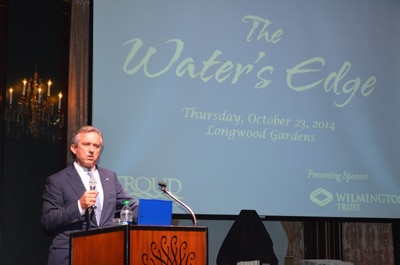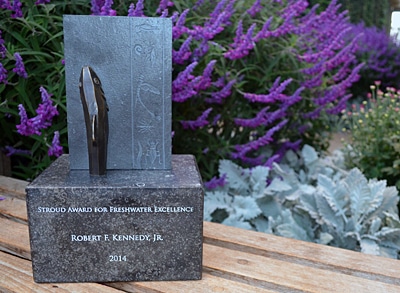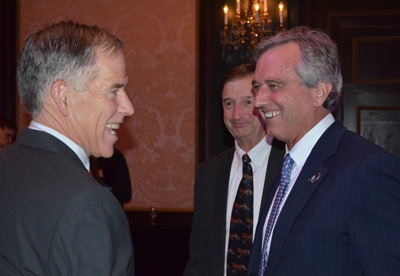
“We have to leave something for our children, not impoverish them,” Robert F. Kennedy Jr. told about 300 attendees who paid up to $500 to attend Stroud Water Research Center’s annual Water’s Edge gala.
For this, as well as his work as an environmental attorney (he is Chief Prosecuting Attorney for Riverkeeper) and numerous books, articles, and lectures he authored about the sources and impacts of stream and river pollution, Kennedy received the 2014 Stroud Award of Freshwater Excellence.
In the fall of each year, Stroud Water Research Center gives this prestigious award to an individual or organization for outstanding achievement in freshwater environmental stewardship or freshwater research and education.
Stroud Center’s board of directors and senior staff applaud Kennedy’s efforts to improve the level of scientific integrity that forms the basis of our nation’s environmental policies and laws, especially those that impact water quality,” said Director Bernard W. Sweeney, Ph.D. prior to the October event.
THE AIR AND WATER BELONG TO ALL

Kennedy said the argument that we must choose between economic prosperity and responsible environmental stewardship is untrue. “Good environmental policy is tied to good economic policy. Environmental injury is deficit spending.”
Kennedy also praised Stroud Water Research Center for its diligent search for objective truth. “In a democracy, you have to stand for truth, and funding the existential search for truth is one of the functions of democracy.” He added that Stroud Center is indifferent to whether its scientific findings offend pollution-causing industries or freshwater advocacy organizations, like Waterkeeper Alliance.
“The air and water are in the commons. They belong to all of us,” Kennedy said, explaining that the legal precedent dates back to antiquity. “One of the first things a tyrant does is to privatize the commons.” He added that businesses that pollute are forcing the public to pay for the costs of their operations: “We have to force polluters to internalize those costs.”
Kennedy said his interest in environmental issues dates back to his childhood. He recalled bringing an ailing salamander to his uncle, President John F. Kennedy, to see if anything could be done for the creature. It was released to die peacefully in the White House rose garden. However, President Kennedy later introduced his eight-year-old nephew to Rachel Carson, author of the book Silent Spring, which exposed the dangers of the pesticide DDT. Kennedy was so inspired that he developed a lifelong passion for environmental advocacy.
THE ORIGINS OF THE RIVERKEEPERS ALLIANCE
Kennedy then told the story about the founding of the Riverkeepers Alliance. He said it’s the offspring of the Hudson River Fishermen’s Association (HRFA), founded in 1966 by a group of concerned fishermen who met at the American Legion Hall in Crotonville, New York. The group was incensed that polluters were destroying the lifestyle of recreational fishermen and the livelihoods of commercial fishermen by destroying a habitat that was once rich with a wide diversity of fish.
Kennedy said when the HRFA discovered that their government officials were “in cahoots with the polluters” they schemed ways to take revenge. One person suggested floating a raft of dynamite beneath the Con Edison piers, where it would be sucked into the intake. Another suggested that Penn Central’s pipe could be plugged with a gasoline-soaked mattress and ignited with a match.

However, Bob Boyle, a fly fisherman and outdoor writer for Sports Illustrated, suggested a less violent and, ultimately, more effective solution. In researching a story, Boyle learned of two little-known laws: the Rivers and Harbors Act of 1888 and the Refuse Act of 1899. Both forbade pollution of American waters and provided a reward for those who reported the violation. Boyle told the fishermen, “We shouldn’t be talking about breaking the law; we should be talking about enforcing it.”
Under Boyle’s leadership, the HRFA agreed to track down and prosecute Hudson River polluters one at a time. Two years later, they shut down the Penn Central Pipe and collected $2,000, the first bounty ever awarded under the 19th-century statute. Soon they were collecting other, more lucrative, bounties.
They used the winnings from these cases to build a Riverkeeper boat, which today patrols the Hudson searching out environmental lawbreakers and bringing them to justice. In 1983, they hired their first full-time Riverkeeper. Kennedy joined the organization as its Chief Prosecuting Attorney a year later. The HRFA changed its name to Riverkeeper in 1986. The organization has since brought hundreds of polluters to justice and forced them to spend hundreds of millions of dollars remediating the Hudson.
“Because of our work, the Hudson, which was a dead river, is now one of the richest water bodies on Earth, with strong, spawning species of fish,” Kennedy said.
He added that the river’s recovery had inspired the creation of more than 200 Waterkeeper organizations worldwide and predicted that that number would swell to 500 in a few years.
The audience responded to Kennedy’s speech with a standing ovation.



